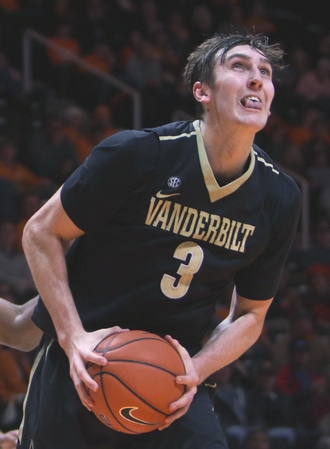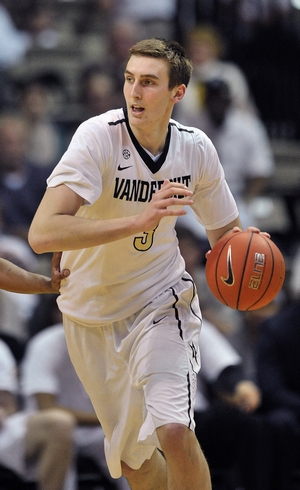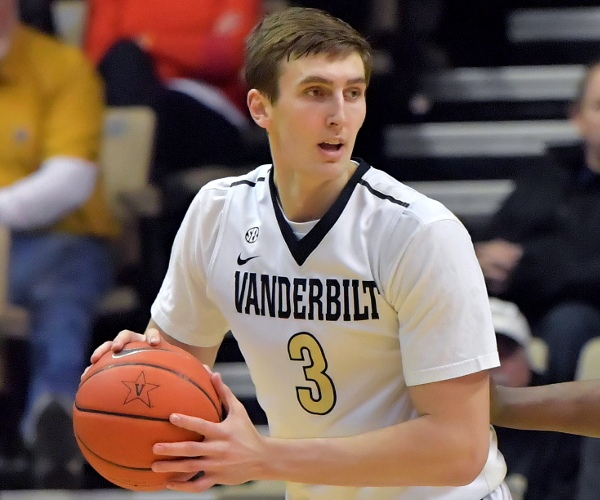Video:
Potential Role: Stretch 5
Why He Fits: 7-footers who can space the floor and protect the rim don't grow on trees, and while not elite at either, the fact that Kornet has even the physical ability to do both gives him a chance at sticking in the NBA. Kornet is one of only 22 NCAA bigs (6'10 or taller) in the past 17 years to average at least 2.0 made threes and 2.0 blocked shots per 40 minutes. He shoots a fairly easy ball, knows how to play within a system, and has fairly good timing around the rim defensively. Kornet has some holes, but he'll certainly get his cracks at sticking in the NBA as it's simply hard to find guys with his natural size and shooting potential.
Key Stat: 2.0 threes made and 2.7 blocks per 40 minutes
Drawbacks: Kornet may fit offensively as a stretch five with a decent feel for the game, but he's quite immobile on the defensive end, struggling to guard pick and roll even in drop situations and leaving much to be desired on the defensive glass. The 7-footer struggles with grit and physicality in traffic, averaging only 6.0 defensive rebounds per 40 minutes, the third worst among centers in the DraftExpress Top 100. Although Kornet was a fairly effective rim protector in the SEC, his average mobility and leaping ability figure to limit him as a defensive anchor in the NBA. Kornet has also been somewhat erratic as a shooter throughout the course of his career - 23% as a freshman, 40.7% as a sophomore, 28% as a junior and 32.7% as a senior. If Kornet isn't making shots, he doesn't bring much to the table, especially with the way the game is trending.
Articles
NCAA TOURNAMENT NBA DRAFT PROSPECT TV SCHEDULE: THURSDAY
Mar 12, 2017, 10:38 pm
After a somewhat slow start to the season, partially due to injury, Luke Kornet came on very strong for Vanderbilt in SEC play, winning First-Team All-Conference honors as well as a spot on the All-Defensive team. Kornet has yet to develop into the sweet-shooting, efficient, 7'1 big man NBA scouts hoped to see him blossom into, with his 3P% continuing to hover around 32% after peaking at 41% as a sophomore. Still, his size, solid feel for the game, theoretical floor-spacing potential and decent instincts defensively (despite his extreme lack of quickness) give hope he can turn into the type of stretch-5 many NBA teams covet.
Against a Northwestern team that isn't especially big, tough, athletic or imposing inside, Kornet should have somewhat of an advantage.
Against a Northwestern team that isn't especially big, tough, athletic or imposing inside, Kornet should have somewhat of an advantage.
Top NBA Draft Prospects in the SEC, Part Four: Prospects 4-7
Oct 04, 2016, 12:44 pm
Derek Bodner
After being overlooked for much of his high school career, Luke Kornet's late growth spurt, and some big performances on the AAU circuit, eventually put him on the map as a recruit. Kornet eventually settled on Vanderbilt, following in the path of his father, Frank Kornet, who helped lead the Commodores to back-to-back NCAA tournament appearances in the late 1980's.

In many respects, Kornet, listed at 7'1", 250 pounds by Vanderbilt, showed progress as a junior for the Commodores. His rebounding, a big weakness in his game up to that point, improved from 6.0 rebounds per 40 minutes, pace adjusted, to 10.9. He blocked significantly more shots (1.9 per 40 minutes, pace adjusted, to 4.4), committed less turnovers (2.2 to 1.6), and got to the free-throw line more (25.7% free-throw rate to 32.9%).
Still, the season on the whole was slightly disappointing for the 7'1" Kornet, in large part because of his struggles shooting from the perimeter. After connecting on an even 40% of his 125 three-point attempts as a sophomore Kornet connected on just 28% as a junior, while taking a step back from the free-throw line as well. Kornet improved somewhat in the second half of the year, shooting 31.4% from three-point range in his last 14 games, compared to just 23.8% in the first 14, but he never truly regained the shooting touch that made him such an intriguing prospect.
Some of Kornet's struggles from the perimeter can come down to shot selection, as he's more than willing to take contested shots, shots off the dribble, and shots from well beyond the collegiate three-point line. Despite his struggles last year Kornet has great mechanics on his jump shot and a repeatable, quick shooting motion that should suggest his struggles last year can be overcome, but becoming a little bit more selective in his shot selection would certainly help him in that regard.
Kornet is mostly an opportunistic scorer outside of jumpers. He has solid touch around the basket and moves well without the ball, but he's mostly a below the rim player, despite his size. He can score on the occasional post-up when he has a size advantage with basic hook shots, but while he's made some minor progress in developing his upper body strength and looks like he has a frame that can continue to fill out, his lower body strength is still a weak point and he struggles to establish decent post position, usually resorting to a low-percentage turnaround jump shot rather than forcing his way inside with a move toward the basket.
Kornet does have some perimeter skills which gives him more than just pick and pop potential, though. While he has a slow first step and not much leaping ability, he does have the requisite ball handling skills to put the ball on the floor and attack closeouts, is capable of making quality decisions with the ball and shows an affinity for passing on the perimeter, and is relatively nimble on his feet, even if not all that quick. Nobody is going to mistake Kornet for a high-level shot creator at the next level, but the skills are there to be able to take advantage of the closeouts he'll receive if he's able to force defenders to respect his jump shot.
Defensively, it's a little bit harder to project Kornet at the next level. While he's able to use his 7'1" size and length to alter shots around the basket, the rest of his defensive game has quite a bit of way to go before he's not a liability on that end of the floor.
Kornet's lack of lower body strength makes it difficult for him to keep even mediocre post scorers from working their way to the basket, and he compounds that with an upright stance and a tendency to not engage until the opponent already has deep post position. He can overcome this at times with an occasional block thanks to his length, but his tendency to get pushed around is something that he's going to have to improve upon as he physically matures.
Kornet also struggles quite a bit on the perimeter, as he's relatively slow of foot, is frequently too upright and off balance, struggles to change direction, and doesn't have the greatest awareness as a defender. The combination of his struggles in the post and his inability to defend the perimeter is going to be tough to overcome, as he would be a liability regardless of whether he's defending the power forward or center position at this stage of his career.
On the plus side, Kornet did make drastic improvements in his output in the defensive glass, grabbing 19.7% of the available defensive rebounds when he was on the court. While this was a significant improvement over the 13.2% he grabbed as a sophomore, it's still an average-at-best figure for a seven-footer who was playing near the basket frequently, and his lack of lower body strength once again was a big factor in this facet of the game. He gave more consistent effort this past season, but he's still going to struggle to physically compete.
In some respects, Luke Kornet made a lot of improvements to round out his game this past season. Still, when you project out Kornet's role to the NBA, he's going to succeed or fail based on his ability as a jump shooter. Injuries and the poor team chemistry Vanderbilt suffered from last year are mitigating factors that likely contributed to the season-long slump he endured, and the form, touch, and potential are clearly there for his jump shot. If he can continue to develop as an all-around player, and regain the shooting touch he showed as a sophomore, he'll stay on the draft radar for a league desperate for big men who can stretch the floor.
After being overlooked for much of his high school career, Luke Kornet's late growth spurt, and some big performances on the AAU circuit, eventually put him on the map as a recruit. Kornet eventually settled on Vanderbilt, following in the path of his father, Frank Kornet, who helped lead the Commodores to back-to-back NCAA tournament appearances in the late 1980's.

In many respects, Kornet, listed at 7'1", 250 pounds by Vanderbilt, showed progress as a junior for the Commodores. His rebounding, a big weakness in his game up to that point, improved from 6.0 rebounds per 40 minutes, pace adjusted, to 10.9. He blocked significantly more shots (1.9 per 40 minutes, pace adjusted, to 4.4), committed less turnovers (2.2 to 1.6), and got to the free-throw line more (25.7% free-throw rate to 32.9%).
Still, the season on the whole was slightly disappointing for the 7'1" Kornet, in large part because of his struggles shooting from the perimeter. After connecting on an even 40% of his 125 three-point attempts as a sophomore Kornet connected on just 28% as a junior, while taking a step back from the free-throw line as well. Kornet improved somewhat in the second half of the year, shooting 31.4% from three-point range in his last 14 games, compared to just 23.8% in the first 14, but he never truly regained the shooting touch that made him such an intriguing prospect.
Some of Kornet's struggles from the perimeter can come down to shot selection, as he's more than willing to take contested shots, shots off the dribble, and shots from well beyond the collegiate three-point line. Despite his struggles last year Kornet has great mechanics on his jump shot and a repeatable, quick shooting motion that should suggest his struggles last year can be overcome, but becoming a little bit more selective in his shot selection would certainly help him in that regard.
Kornet is mostly an opportunistic scorer outside of jumpers. He has solid touch around the basket and moves well without the ball, but he's mostly a below the rim player, despite his size. He can score on the occasional post-up when he has a size advantage with basic hook shots, but while he's made some minor progress in developing his upper body strength and looks like he has a frame that can continue to fill out, his lower body strength is still a weak point and he struggles to establish decent post position, usually resorting to a low-percentage turnaround jump shot rather than forcing his way inside with a move toward the basket.
Kornet does have some perimeter skills which gives him more than just pick and pop potential, though. While he has a slow first step and not much leaping ability, he does have the requisite ball handling skills to put the ball on the floor and attack closeouts, is capable of making quality decisions with the ball and shows an affinity for passing on the perimeter, and is relatively nimble on his feet, even if not all that quick. Nobody is going to mistake Kornet for a high-level shot creator at the next level, but the skills are there to be able to take advantage of the closeouts he'll receive if he's able to force defenders to respect his jump shot.
Defensively, it's a little bit harder to project Kornet at the next level. While he's able to use his 7'1" size and length to alter shots around the basket, the rest of his defensive game has quite a bit of way to go before he's not a liability on that end of the floor.
Kornet's lack of lower body strength makes it difficult for him to keep even mediocre post scorers from working their way to the basket, and he compounds that with an upright stance and a tendency to not engage until the opponent already has deep post position. He can overcome this at times with an occasional block thanks to his length, but his tendency to get pushed around is something that he's going to have to improve upon as he physically matures.
Kornet also struggles quite a bit on the perimeter, as he's relatively slow of foot, is frequently too upright and off balance, struggles to change direction, and doesn't have the greatest awareness as a defender. The combination of his struggles in the post and his inability to defend the perimeter is going to be tough to overcome, as he would be a liability regardless of whether he's defending the power forward or center position at this stage of his career.
On the plus side, Kornet did make drastic improvements in his output in the defensive glass, grabbing 19.7% of the available defensive rebounds when he was on the court. While this was a significant improvement over the 13.2% he grabbed as a sophomore, it's still an average-at-best figure for a seven-footer who was playing near the basket frequently, and his lack of lower body strength once again was a big factor in this facet of the game. He gave more consistent effort this past season, but he's still going to struggle to physically compete.
In some respects, Luke Kornet made a lot of improvements to round out his game this past season. Still, when you project out Kornet's role to the NBA, he's going to succeed or fail based on his ability as a jump shooter. Injuries and the poor team chemistry Vanderbilt suffered from last year are mitigating factors that likely contributed to the season-long slump he endured, and the form, touch, and potential are clearly there for his jump shot. If he can continue to develop as an all-around player, and regain the shooting touch he showed as a sophomore, he'll stay on the draft radar for a league desperate for big men who can stretch the floor.
Top NBA Prospects in the SEC, Part Ten: Prospects #15-20
Oct 03, 2015, 05:32 pm
Kyle Nelson
Between his junior and senior seasons in high school, Luke Kornet grew from 6'3 to 6'10. Now listed at 7'1, Kornet has developed into a unique commodity, a big man with unlimited range who can also score efficiently around the basket. While Kornet emerged as an intriguing, albeit inconsistent player, scouts will be watching to see if he can take the next step forward as a junior alongside of Damion Jones.

At 7'1 and 240-pounds with long arms, Kornet has excellent size for either post position. The junior big man needs to tone his frame considerably, however, as his 240-pound frame still has a ways to go to reach its full potential, even if he has big shoulders and plenty of room to keep filling out. He is not a particularly impressive athlete, either, lacking standout quickness and explosiveness, even if he can exploit matchups with slower-footed defenders on the perimeter with highly fluid closeouts. Coming off of foot surgery over the summer, just how well Kornet can maximize his physical tools carries significant implications for his professional prospects.
Playing mostly a backup role for Vanderbilt, Kornet averaged 16.3 points per 40 minutes pace adjusted and attempted more shots from beyond the arc than he did inside it, which makes perfect sense considering the success he enjoyed on the perimeter.
Kornet's most intriguing attribute from an NBA perspective is his perimeter shooting ability. While his release can still get quicker, he has picture perfect form and range out to the NBA 3-point line. Kornet made 40.7% of his 6.8 three point field goal attempts per 40 minutes pace adjusted, standing out as one of the top perimeter shooting big men in our database. Kornet looked particularly impressive as a spot-up option, ranking in the 99th percentile among college basketball players (and #1 among NBA prospects) in those situations according to Synergy Sports Technology. Kornet's unlimited range and impressive ability to stretch the floor is a valuable skill worth monitoring moving forward, especially with the NBA's increasing emphasis on having shooters at every position on the floor.
Inside of the three-point line, Kornet proved to be a mixed bag. On the one hand, he made an impressive 62% of his 2-point attempts, including 48.1% of his post up looks and 74% of his non-post up shot attempts inside the paint. In the post, Kornet demonstrates a soft touch, developing footwork, and a willingness to pass out of trouble. On the other hand, stronger defenders easily push him off the block due to his lack of strength and he struggles to finish through contact in traffic.
While Kornet's strengths, and future obviously lie farther away from the basket, his scouts will want to see him develop other NBA-caliber skills on the offensive end of the floor to not render him a one-dimensional player. He showed some potential as a passer and attacking closeouts in small doses, which are things he can continue to fine-tune to add versatility to his game.
While Kornet has a clear-cut role offensively at the pro level, his ability to hold his own on the other end of the floor remains a question mark. His 6.1 rebounds per 40 minutes pace adjusted rank him among the worst rebounding big men in our database, and would put him among the lowest figures ever for a big man draft pick if they continued to hold true.
His lack of strength and quickness also limits him as a post defender, where stronger offensive players have little trouble backing him down or spinning by him to the basket. Furthermore, his subpar foot speed does him few favors guarding the pick-and-roll or staying in front of offensive players who face him up. His size and length do allow him to block 1.9 shots per 40 minutes pace adjusted, but at this point it is hard he has significant work ahead of him before he can be counted on to defend either post position at the next level.
Thus, while Kornet is an extremely unique player with his combination of size and shooting touch, he has a long way to maximize his potential as a NBA prospect. In the meantime, he must continue to get stronger and improve his rebounding and defense. With a more consistent junior season, Luke Kornet should continue to get attention from scouts and has the potential to develop into a legitimate NBA prospect before he is done in Nashville.
Between his junior and senior seasons in high school, Luke Kornet grew from 6'3 to 6'10. Now listed at 7'1, Kornet has developed into a unique commodity, a big man with unlimited range who can also score efficiently around the basket. While Kornet emerged as an intriguing, albeit inconsistent player, scouts will be watching to see if he can take the next step forward as a junior alongside of Damion Jones.

At 7'1 and 240-pounds with long arms, Kornet has excellent size for either post position. The junior big man needs to tone his frame considerably, however, as his 240-pound frame still has a ways to go to reach its full potential, even if he has big shoulders and plenty of room to keep filling out. He is not a particularly impressive athlete, either, lacking standout quickness and explosiveness, even if he can exploit matchups with slower-footed defenders on the perimeter with highly fluid closeouts. Coming off of foot surgery over the summer, just how well Kornet can maximize his physical tools carries significant implications for his professional prospects.
Playing mostly a backup role for Vanderbilt, Kornet averaged 16.3 points per 40 minutes pace adjusted and attempted more shots from beyond the arc than he did inside it, which makes perfect sense considering the success he enjoyed on the perimeter.
Kornet's most intriguing attribute from an NBA perspective is his perimeter shooting ability. While his release can still get quicker, he has picture perfect form and range out to the NBA 3-point line. Kornet made 40.7% of his 6.8 three point field goal attempts per 40 minutes pace adjusted, standing out as one of the top perimeter shooting big men in our database. Kornet looked particularly impressive as a spot-up option, ranking in the 99th percentile among college basketball players (and #1 among NBA prospects) in those situations according to Synergy Sports Technology. Kornet's unlimited range and impressive ability to stretch the floor is a valuable skill worth monitoring moving forward, especially with the NBA's increasing emphasis on having shooters at every position on the floor.
Inside of the three-point line, Kornet proved to be a mixed bag. On the one hand, he made an impressive 62% of his 2-point attempts, including 48.1% of his post up looks and 74% of his non-post up shot attempts inside the paint. In the post, Kornet demonstrates a soft touch, developing footwork, and a willingness to pass out of trouble. On the other hand, stronger defenders easily push him off the block due to his lack of strength and he struggles to finish through contact in traffic.
While Kornet's strengths, and future obviously lie farther away from the basket, his scouts will want to see him develop other NBA-caliber skills on the offensive end of the floor to not render him a one-dimensional player. He showed some potential as a passer and attacking closeouts in small doses, which are things he can continue to fine-tune to add versatility to his game.
While Kornet has a clear-cut role offensively at the pro level, his ability to hold his own on the other end of the floor remains a question mark. His 6.1 rebounds per 40 minutes pace adjusted rank him among the worst rebounding big men in our database, and would put him among the lowest figures ever for a big man draft pick if they continued to hold true.
His lack of strength and quickness also limits him as a post defender, where stronger offensive players have little trouble backing him down or spinning by him to the basket. Furthermore, his subpar foot speed does him few favors guarding the pick-and-roll or staying in front of offensive players who face him up. His size and length do allow him to block 1.9 shots per 40 minutes pace adjusted, but at this point it is hard he has significant work ahead of him before he can be counted on to defend either post position at the next level.
Thus, while Kornet is an extremely unique player with his combination of size and shooting touch, he has a long way to maximize his potential as a NBA prospect. In the meantime, he must continue to get stronger and improve his rebounding and defense. With a more consistent junior season, Luke Kornet should continue to get attention from scouts and has the potential to develop into a legitimate NBA prospect before he is done in Nashville.






























Comments